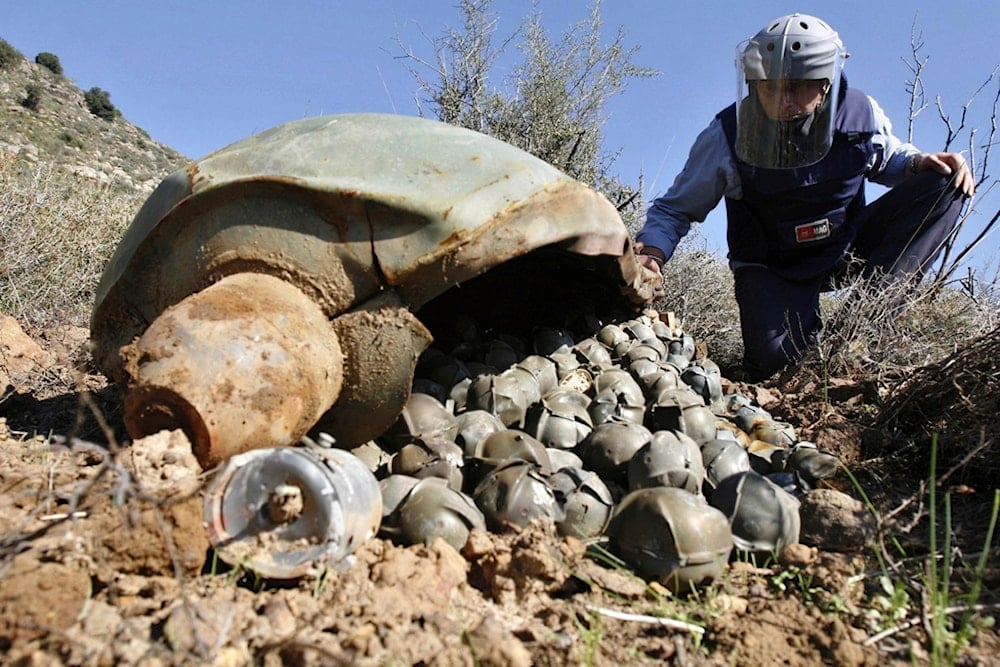'Israel' shelled southern regions with banned cluster bombs: Hezbollah
Hezbollah's Media Relations Office issued a statement confirming that the Israeli occupation forces used rockets filled with internationally banned cluster bombs on several towns in South Lebanon.
-

Mines Advisory Group Technical Field Manager inspecting a Cluster Bomb Unit in the southern village of Ouazaiyeh, Lebanon, on Nov. 9, 2006, after it was dropped by "Israel" amid the war on Lebanon. (AP)
Hezbollah's Media Relations Office released a statement on Tuesday evening, confirming that Israeli occupation forces had bombed the areas of Wadi al-Khanazir in Wadi al-Hujair, Khallat Raj, located between the towns of Aalman and Deir Siryan, and east of Aalman toward the forests in southern Lebanon with bombs loaded with internationally banned cluster bombs.
The statement condemned this "barbaric crime", which is added to the series of atrocities committed by the Israeli occupation against the Lebanese and Palestinian peoples and comes due to the Israeli occupation's "blatant failure in direct confrontations with Islamic Resistance fighters."
It also denounced "Israel’s" disregard for international laws and conventions, especially during wartime.
Hezbollah called on relevant authorities in Lebanon and international human rights organizations to "condemn this heinous crime by all measures," emphasizing the long-term harmful effects these attacks have on civilians.
This attack is not the first of its kind, as in an earlier statement by the Media Relations Office, on October 13, it was also detailed that the attacks on several southern villages involved the use of cluster munitions, a type of weapon that is banned under international law due to its potential to cause widespread harm to civilians, as per the statement.
What are cluster bombs and why are they banned?
The use, transfer, production, and stockpiling of cluster munitions have been banned by over 100 nations under the Convention on Cluster Munitions since 2010. Some countries did not agree to participate in the Convention and refused to sign this agreement.
The US, being one of these countries, is ignoring the fatal outcomes of these munitions as it insists on sending cluster bombs to Ukraine.
Not an isolated incident
Human Rights Watch confirmed that the Israeli occupation used white phosphorus in its attacks on Gaza and Lebanon on October 10 and 11 of last year.
In a Q&A article about white phosphorus, Human Rights Watch expressed concerns about the Israeli occupation's use of phosphorus in military operations in Gaza and Lebanon, highlighting the serious and long-term risks it poses to civilians.
Human Rights Watch substantiated these claims with video evidence from Lebanon and Gaza, which depicted multiple airbursts of artillery-fired white phosphorus over the Gaza City port and two rural locations along the occupied Palestine-Lebanon border.
White phosphorus, with its dual capability for marking, signaling, and obscuring or as an incendiary weapon, can cause severe burns to individuals and ignite structures, fields, and other civilian objects in the vicinity.
The use of white phosphorus in Gaza, one of the most densely populated areas globally, significantly heightens the danger to civilians and constitutes a breach of international humanitarian law's prohibition on needlessly endangering civilians.
International law explicitly forbids the use of phosphorus, and such actions are considered violations by the occupying forces. It's worth noting that assaults employing air-delivered incendiary weapons in civilian areas are outlawed under Protocol III of the Convention on Conventional Weapons (CCW).
Lama Fakih, Director of the Middle East and North Africa division at Human Rights Watch, emphasized, "Whenever white phosphorus is employed in densely populated civilian zones, it presents a grave risk of agonizing burns and enduring suffering."
She further explained, "White phosphorus is inherently indiscriminate when airburst in densely populated urban regions, as it can ignite buildings and cause severe harm to civilians."
Chemical properties
White phosphorus is a combustible (ignites when exposed to oxygen) and a severely fatal chemical. The combustible reaction produces light, heavy white smoke, and heat of about 815°C.
White phosphorus is highly soluble in human flesh and causes deadly thermal and chemical burns that can go as deep as the bones.
Direct contact is extremely excruciating and can leave long-lasting damage to internal organs. Even inhaling its vapor can cause severe inflammation in the trachea.
Under International Law
The use of white phosphorus bombs, which fall under the category of incendiary weapons in international law, is governed by Article 2 Protocol III of the 1980 Convention on Certain Conventional Weapons (to which "Israel" is a signatory).
Article 2.1 reads that the use of white phosphorus bombs against civilians and civilian objects is absolutely prohibited.
Furthermore, Article 2.2 specifies that even targeting any military objective located within a concentration of civilians by airstrikes is also categorically prohibited.
Israeli precedents in employing phosphorus
The Israeli occupation forces had long used various internationally prohibited weapons against civilians in violation of international humanitarian law.
Israeli occupation forces employed white phosphorus bombs in 2006 against Lebanese civilians, in 2008-2009 against Palestinian civilians in Gaza, and again in 2014 against civilians in Gaza.
In all three wars, "Israel" claimed to use phosphorus bombs for illumination purposes.
Read more: IOF attacks on Lebanon first responders potenial war crimes: Intercept

 5 Min Read
5 Min Read








